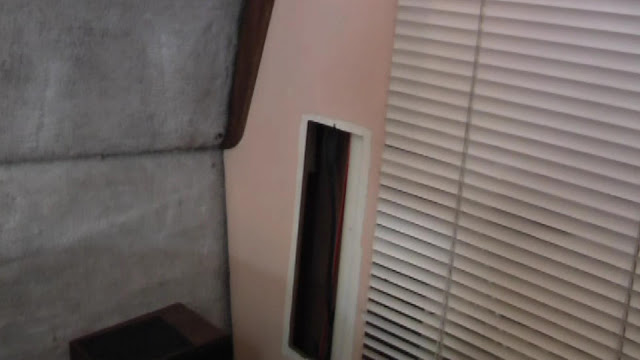We skipped the boat entirely last weekend because of the snow. We've had an easy winter so far so we'll not complain. However, we did sit through the accumulation of about a foot of snow, exercised the snowblower several times and got to watch the birds at our bird feeder. They don't care much about us when they can find things to eat on the ground but once it snows, we're one the most popular bird spots in town.
Watching the birds and enjoying Frances' excellent cooking are the best parts of winter.
With the warmer weather this weekend, we arrived at the boat, full of energy to get some of these old projects complete.
The project to get more light in our head is complete but we still had to clean up the wiring in the locker forward of the head, which is where we ran the wires for the new lights. We used a terminal strip mounted on the forward wall of that locker to make the power connections and we wanted to cover it so that clothing wouldn't snag on it. We ended up using the top of one of Frances' little plastic storage boxes to cover the wiring and the terminal strip (the blue thing at the right in the photo below). That worked fine and once the door was re-hung, the jackets (and a dozen coat hangers) put back inside, we called that project complete too.
In the last chapter of this epoch history of owning a enjoying an old Silverton, we mentioned adding a fuse for all of this extra lighting and a gauge to monitor our battery voltage. That all works now, as well. Kinda cool to be able to flip a switch and read the voltage on each of our battery banks. Yes, we could turn each ignition switch on and see the voltage there at the helm but that's with the load of the engine ignition systems, so it's not entirely accurate. Voltage at rest, with no load (and no battery charger) is a good way to judge the health of the batteries. And besides, we had all of these parts in our boat stash, so why not use them?
Then there's the addition of two new LED reading lights in the cabin. Looked so easy and so far has been much more difficult to do, mainly because all the wiring has to be hidden.
Here's the new light on the starboard side mounted.
Looks good, but chasing the power wire for it, down behind that wall and then down into the engine space was a two-hour exercise in frustration. Nothing would fit and then, just as we were going to call it a day, the last wire we fed down appeared in the access panel opening down near the floor.
That opening also allows access to all the cables and wiring that goes to the fly bridge. It also gave us access to the wiring and cables behind that wall so that we could get power to the new reading light. But there is no convenient little panel opening like this for us to remove on the port side and that's where we want to mount the other reading light.
We're going to have to think about that one for a while. And we thought this was going to be so easy.
Video
We shot some video of what we did on the boat this weekend that is anything but exciting. The issue is that it's difficult to do the work and then go back and photograph it in an interesting way. That requires a camera or two, extra lights and some advance idea of what we we think you'll like to see. The editing of that material is another story. When we come back from the boat, usually pretty tired, we have 15-20 different shots, some of which are unusable. Putting the good shots together takes another 2-3 hours.We're only mentioning this because we have two audiences: those friends who read our blog and the hundreds who follow us on You Tube. So we are serving two masters here. Showing our friends what we've doing and, at the same time, showing something interesting to You Tube viewers who are really into boats.
That said, here is the video for this past weekend.






